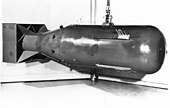
| Nuclear weapons |
|---|
 |
| Background |
| Nuclear-armed states |
|
Nuclear disarmament is the act of reducing or eliminating nuclear weapons. Its end state can also be a nuclear-weapons-free world, in which nuclear weapons are completely eliminated. The term denuclearization is also used to describe the process leading to complete nuclear disarmament.[2][3]
Disarmament and non-proliferation treaties have been agreed upon because of the extreme danger intrinsic to nuclear war and the possession of nuclear weapons.
Proponents of nuclear disarmament say that it would lessen the probability of nuclear war occurring, especially considering accidents or retaliatory strikes from false alarms.[4] Critics of nuclear disarmament say that it would undermine deterrence and make conventional wars more common.
- ^ "BBC NEWS : Magazine : World's best-known protest symbol turns 50". BBC News. London. March 20, 2008. Archived from the original on March 20, 2012. Retrieved May 25, 2008.
- ^ Gastelum, ZN (2012). "International Legal Framework for Denuclearization and Nuclear Disarmament" (PDF). Pacific Northwest National Laboratory. p. 7. Archived (PDF) from the original on December 21, 2016. Retrieved May 18, 2018.
The term denuclearization is even less agreed upon [than disarmament] in the international community, and appears rarely in the context of arms control and nuclear nonproliferation. For the purpose of this paper, denuclearization will be defined as the elimination of the military infrastructure and materials necessary for nuclear weapons production.
- ^ Da Cunha, Derek (2000). Southeast Asian Perspectives on Security. Institute of Southeast Asian Studies. p. 114. ISBN 978-981-230-098-0.
"Denuclearization" may be defined as political/normative attitudes towards nuclear disarmament, with a complete ban on nuclear weapons as the objective. The ultimate aim of denuclearization is to achieve a nuclear weapons-free world.
- ^ "Nuclear False Warnings and the Risk of Catastrophe | Arms Control Association". www.armscontrol.org. Retrieved 2024-03-13.